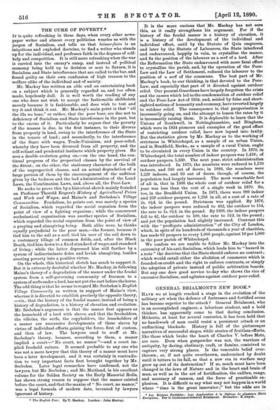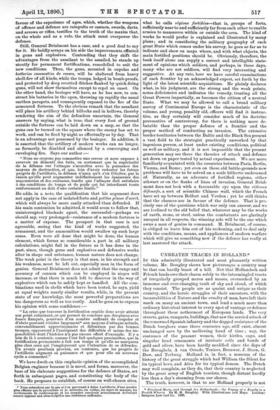GENERAL BRIALMONT'S NEW BOOK.* HAVE we at length reached a
stage in the evolution of the military art when the defence of fortresses and fortified areas has become superior to the attack ? General Brialmont, who is an accomplished engineer, a laborious student, and a bold thinker, has apparently come to that daring conclusion. Hitherto, at least for several centuries, it has been held that no handiwork of man could resist a persistent attack or an unflinching blockade. History is full of the picturesque narratives of successful sieges, while stories of fruitless efforts, like those which broke the heart of Charles V. before Metz, are rare. Even when gunpowder was not, the warriors of antiquity, by daring, obstinacy, craft, or famine, contrived to capture very strong places. Is the venerable belief over. thrown ; or, if not quite overthrown, undermined by doubt until it totters to ita fall, so that a new era in warfare may grow up out of its destruction? If so, much must have been changed in the laws of Nature and in the heart and brain of man, as well as in the art of fortification, the calibre, range, and accuracy of cannon, and the force of practicable ex- plosives. It is difficult to say what may not happen in a world where "time is the great innovator ;" but the odds are in
• Les Regions Portifuies : lour Application d la Alfonso de plsisisurs RiotsEuropiena. Par le Lieutenant,Gonciral Brialmont. Bruxelles : (*wt.
favour of the experience of ages, which, whether the weapons of offence and defence are catapults or cannon, swords, darts, and arrows or rifles, testifies to the truth of the maxim that, on the whole and as a rule, the attack must overpower the defence.
Still, General Brialmont has a case, and a good deal to say for it. He boldly arrays on his side the improvements effected in guns and explosives. Contending that they shift the advantages from the assailant to the assailed, he stands up stoutly for permanent fortifications, remodelled to suit the
new conditions. Thus, the guns, mounted in cupolas and batteries caseraatees de revers, will be sheltered from heavy
shell-fire of all kinds, while the troops, lodged in bomb-proofs, and protected by deep revetted ditches flanked by quick-firing guns, will not show themselves except to repel an onset. On the other hand, the besieger will have, as he has now, to con- struct his batteries in the open, throwing up rapidly the usual earthen parapets, and consequently exposed to the fire of the armoured fortress. To the obvious remark that the assailant will place his artillery behind hillocks and in hollows, thereby rendering the aim of the defenders uncertain, the General answers by saying, what is true, that every foot of ground outside the fortress can be laid down on a map, so that the gulls can be turned on the square where the enemy has set to work, and can be fired by night as effectually as by day. That is an advantage not possessed by the besieger. In addition, it is asserted that the artillery of modern works can no longer, as formerly, be disabled and silenced by a converging and enveloping fire. Says our author :—
" Nous ne croyous pm commettre tine erreur at nous exposer a recevoir un dementi des faits, en soutenant que la superiorite de In defense mar rattaque s'accroitra avec la puissance des moyens de destruction, et qua, loin d'avoir redouter lea futtus progres de rartillerie, In defense n'aura gu'à s'en feliciter, par la raison qu'elle pent augmenter indefinitement les epaisseurs des maeonneries at des cuirasses, tandis que rattaque doit satisfaire A des conditions de temps et de poids qui lui interdisent toute renforeement au dell, d'une certaine limite."
He adds, in a note, the qualification that his argument does not apply in the case of isolated forts and petites places d'arret, which will always be more easily attacked than defended. If his main contention be admitted, it would seem to follow that,
uninterrupted blockade apart, the successful—perhaps we should say, very prolonged—resistance of a modern fortress is a matter of expense. The prospect in that case is not agreeable, seeing that the kind of works suggested, the armament, and the ammunition would swallow up such large sums. Even were all done that might be done, the human
element, which forms BO considerable a part in all military calculations, might fail in the future as it has done in the
past, since, though guns and explosives and defensive works alter in shape and substance, human nature does not change.
The weak point in the theory is that man, in his strength and his weakness, must be left out, especially man in the form of
genius. General Brialmont does not admit that the range and accuracy of cannon which can be employed in sieges will increase, or that there is much left to discover in the way of explosives which can be safely kept or handled. All the com- binations used in shells which have been tested, he says, yield at equal weights nearly similar results, while, in the present state of our knowledge, the most powerful preparations are too dangerous as well as too costly. And he goes on to express his opinion with some confidence :—
"La arise que traverse la fortification semble done avoir atteint son point culminant, ce qui permet de conclure que des places avec fosses flanques, pourvues d'un nombre snffisant de coupoles et d'abris pouvant resister largement* aux moyens d'attaque actuels, eonvenablement approvisionnees at defendues par des bonnes troupes, opposeront a rassiegeant des difficultes et mime des im- possibilites dont l'histoire n'a pm encore offert d'exemple. Ii y a loin de la a soutenir, comma l'ont fait quelques pessimistes, que la fortification permanente a fait son temps et qu'elle ne marquera plus chez cenx qui remployeront qua rintention de se defendre. tin avenir prochain provers, an contraire, que lee progres de rartillerie augment as puissance at quo pour elle un nouveau cycle a commence."
We have dwelt on this emphatic opinion of the accomplished Belgian engineer because it is novel, and forms, moreover, the base of his elaborate suggestions for the defence of States, set forth in subsequent pages, and constituting the body of the hook. He proposes to establish, of course on well-chosen sites,
* Nous entendons par a que si Ion parvenait I doter rartillerie d'une pondre plus efficace clue la pyroalline at is melenite, lee vofttes, lee mnrs de masque, lee revetemente as contresearpe et lee oonpoles eonstruit aetnellement devraient encore opposer aux obus-torpillee une resistance safasante.
what he calls regions fortifties—that is, groups of forte, sufficiently near to and sufficiently far from each other to enable armies to manceuvre within or outside the area. The kind of works he would prefer is explained and illustrated by many plans ; and in considering the military geography of each great State which comes under his survey, he goes so far as to indicate and show on maps where, and with what objects, the main fortified positions should be. Obviously, therefore, the book itself alone can supply a correct and intelligible state- ment of opinions which soldiers, and perhaps, in these days, many who are not soldiers, will find very interesting and suggestive. At any rate, here we have careful examinations of each frontier by an acknowledged expert, set forth by the light of the latest scientific acquisitions. He plainly declares what, in his judgment, are the strong and the weak points, notes deficiencies and indicates the remedy, treating all the Great Powers impartially, as becomes the citizen of a neutral State. What we may be allowed to call a broad military survey of Continental Europe is the characteristic of the volume, and young, possibly old, officers will find it instruc- tive, as they certainly will consider much of its doctrine provocative of controversy, for there is nothing more de- batable than the proper defence of a frontier and the proper method of conducting an invasion. The extensive border territories between the Baltic and the Black Sea present a vast field to the strategist practically unworked by that ingenious person, at least under existing conditions, political as well as military, and it is not impossible that the present generation may see there the theories of attack and defence set down on paper tested by actual experiment. We are more familiarly acquainted with the countries between Paris, Berlin, Vienna, and Rome ; yet even on these old battle-grounds new problems will have to be solved on a scale hitherto undreamed of. Naturally, as an advocate of fortified regions, either athwart or on the flanks of lines of invasion, General Brial- mont does not look with a favourable eye upon the rideaux defensifs, a sort of scientific Chinese wall, which the French have set up between Belfort and Verdun ; yet he still thinks that the chances are in favour of the defence. That is pre- cisely one of the questions which war only can answer, and we are inclined to the old belief that, whatever may be the works of earth, stone, or steel, unless the combatants are glaringly unequal in all respects, the winning side will be the one which owns a man of genius in command. M. Brialmont, of course, is obliged to leave him out of his reckoning, and to deal only with the conditions, means, and appliances of modern warfare which will give us something new if the defence has really at last mastered the attack.



































 Previous page
Previous page